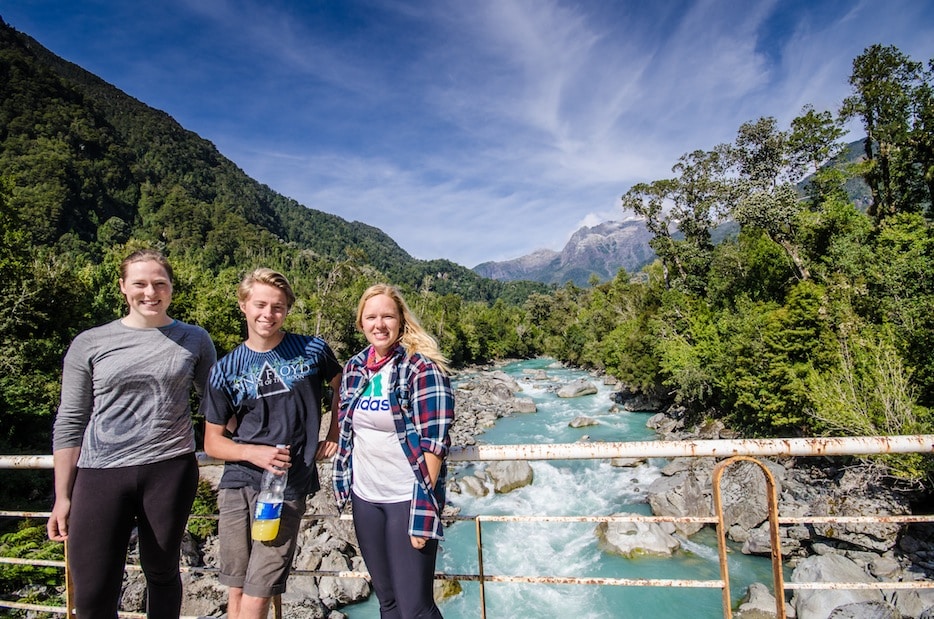Concussion Recognition and Treatment in the Backcountry
Wilderness Medicine TrainingConcussion recognition and treatment has gotten a lot of attention over the last decade, mostly in the context of youth and professional sports such as tackle football and soccer. It’s even a topic for those who serve in our armed forces. However, confusion over its prevention, diagnosis, and treatment remains widespread.
In an interview with a reporter from the Chicago Sun Times, former National Football League quarterback Brett Favre, who was knocked out cold only once in his 20-year career, claimed that “probably 90 percent” of the tackles he endured left him with a concussion.
He’s most likely correct in that estimation. After all, the definition of “concussion” is broad: “A concussion is a brain injury, a disturbance in brain function induced by traumatic forces, either from a direct blow to the head or a transmitted force from a blow to the body.” It disrupts brain function at the cellular metabolic level but does not result in major structural damage. Conventional MRI or CT scanning will not show evidence of a concussion.
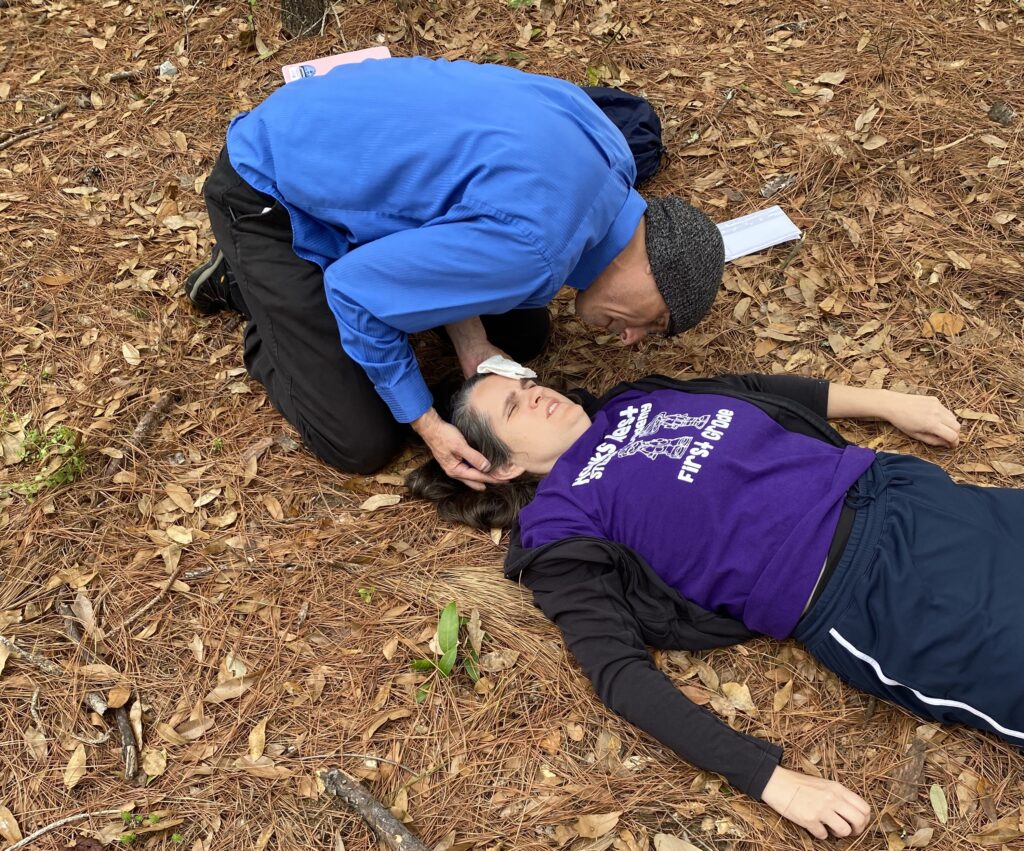
So, how do you know if you or someone else has suffered a concussion while in the backcountry? And, after having made that determination, what should be done? Having clear answers to these two questions is essential for successful recovery and to prevent long-term cognitive and psychological complications. This is true no matter where the concussion takes place, but especially in the backcountry where medical treatment from a full-time team is unavailable. (more…)
Avoiding Target Fixations and Incident Pits in the Backcountry
Risk Management“Look where you want to go!”
I have conveyed this message to wilderness course participants countless times, shouting, screaming, and using hand signals when necessary. Sometimes I’m yelling above the roar of a set of rapids or the sound of an adjacent waterfall.
“Look where you want to go!”
I emphatically issue the same advice while watching climbers rappelling down a cliff, or verbally guiding a student on a mountain bike through a sketchy section of trail. In each case, the point of my shouting is to get the students to stop looking at the obstacle.
“Look where you want to go” really translates as “Stop looking at the obstacle! Don’t fixate on the hazard!”
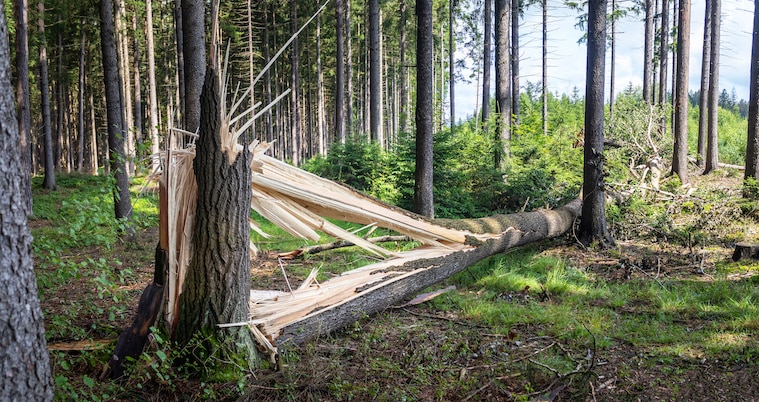
And it doesn’t matter if you’re a Wilderness First Responder approaching the scene of a backcountry incident, or a student on a wilderness course attempting to navigate a perceived hazard or obstacle, looking too closely at a hazard you want to avoid can be very dangerous.
At first glance — no pun intended — you might think it wise to actually look closely at the hazard you want to avoid. No argument there. You absolutely need to identify obstacles, especially in the backcountry and other places considered Wilderness. In fact, identifying an obstacle is a key factor in remaining safe.
But here’s the thing: (more…)
Most EMS Terminology Comes Down to Initials, Abbreviations and Acronyms
EMT TrainingA few years ago, we ran a three-part series on slogans, slang, and terminology as it applies to a trio of human-powered outdoor recreational activities. If you recall, we started out with some “gnarly” surfing terms, then we “tied in” to a conversation about climbing, finally pulling a “wet exit” on the language of paddling.
You can review these three articles using the links below:
- From Sept. 20, 2020: Surfing Terminology and Slang: You Can’t Play BINGO Without the Lingo
- From Oct. 10, 2020: On Belay — Climbing Terminology and Slang
- From Oct. 30, 2020: Paddling Terminology and Slang: Nobody Says ‘Up a River Without an Oar’
There was quite a bit of word whimsy in those articles, and we made sure to remind readers that successfully lassoing the linguistics of a particular activity was no guarantee you were mastering that particular sport professionally.
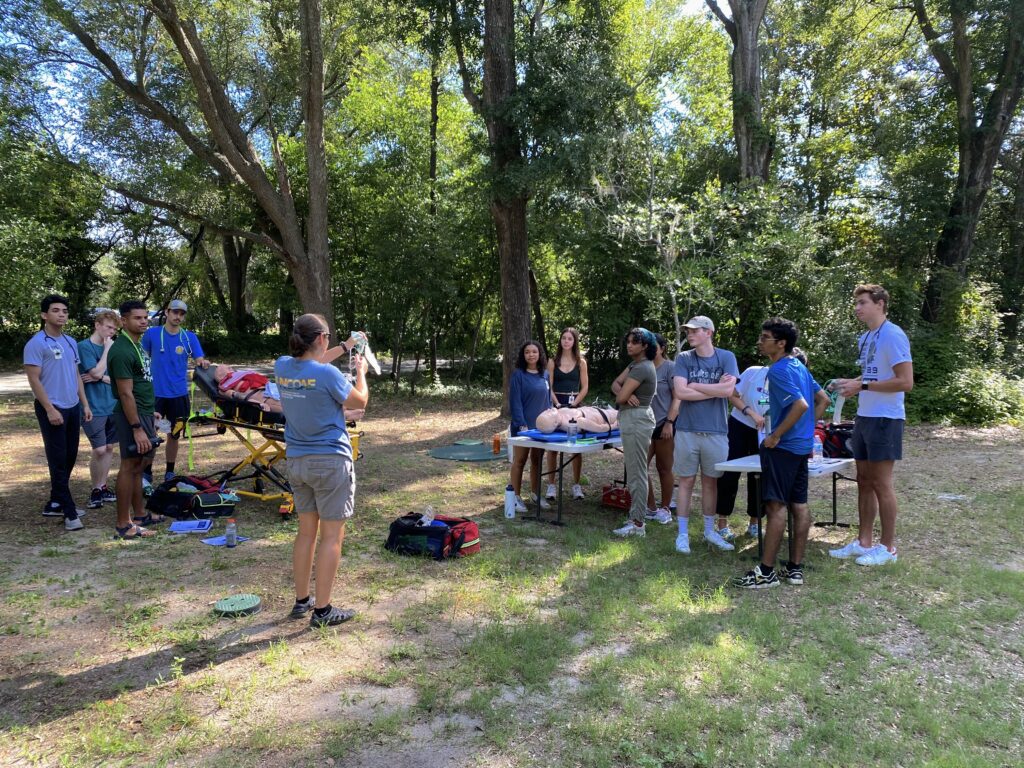
Today we’re taking a more serious look at language, this time highlighting the terminology used by members of the Emergency Medical Service (EMS) community. That’s because one of our areas of focus here at The National Center for Outdoor & Adventure Education (NCOAE) is emergency medicine training and education. And whether you’re an EMS, medical professional, or wilderness first responder (WFR), these terms are most often employed when these professionals find themselves managing a medical emergency.
First off, you might notice that most of these terms come in the form of acronyms, abbreviations, and initials, and the reason for that is to enable first responders to quickly communicate and react with each other and the patient in the field.
The source for these acronyms comes from the NCOAE Wilderness Medicine Field Guide (ISBN 978-0-578-87449-4).
Here, we present them in alphabetical order: (more…)
Outdoor Industry Jobs Require Personal Experience and Certifications
Outdoor Educator TrainingProfessional development — learning that allows you to earn or maintain professional credentials — is key to career planning, especially when it comes to considering a career in the outdoor adventure and education industry. Much more than participating in a bunch of classes, our sector of the outdoor industry looks favorably on applicants with wilderness medicine training and certification, skills training and certification, and hands-on guiding and expedition leadership experience.
Truth is, we here at NCOAE found that operating an adventure education company during a health pandemic was challenging. And staffing our AEE-accredited organization with highly experienced instructors became increasingly difficult but not impossible.
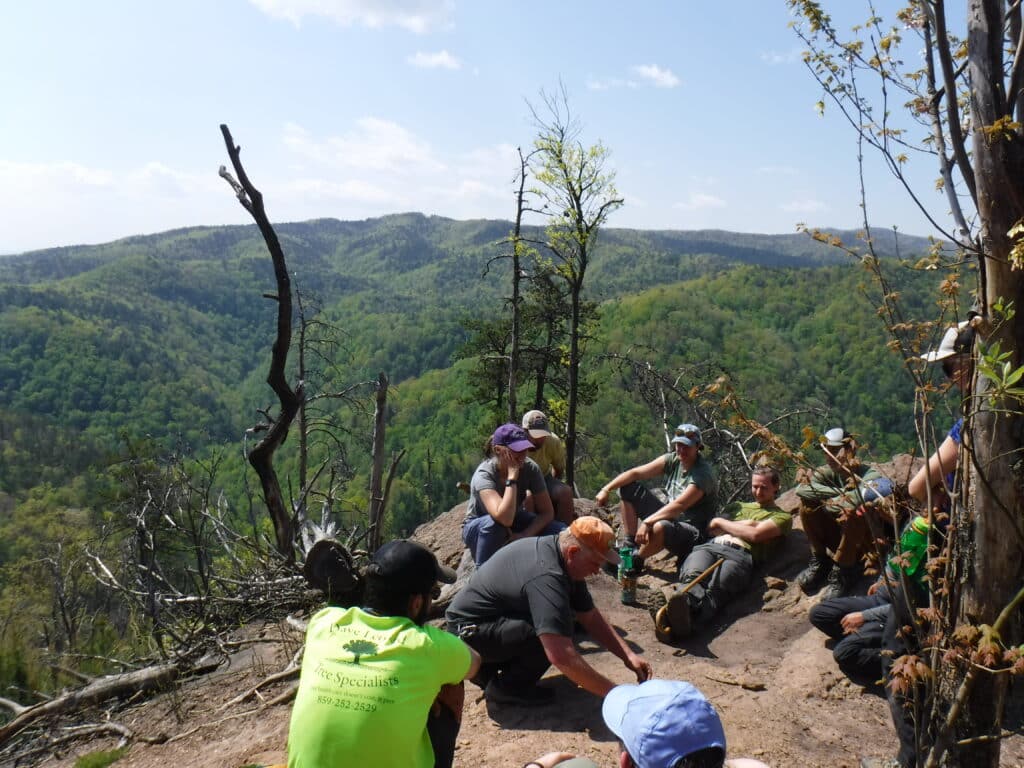
Like other industries, we suffered a staffing shortage, and yes, some of our existing staff left to pursue other pathways. But what we’ve noticed lately is a lack of experience from some people who thought working in the outdoors would — quite literally — be a walk in the park.
Many of these would-be outdoor educators and guides decided that sitting on a couch while looking at photos and films of wilderness expeditions was a suitable alternative for actually going out and experiencing the outdoors.
This potential pool of applicants backed out and went the way of the “Instagram Adventurer” or the “Armchair Explorer.” And in talking with our colleagues across our sector of the outdoor industry, we’re not alone in seeing this trend. Nearly all outdoor adventure and education organizations are taking pause and evaluating the future of trainings, staff recruitment, and what it means to be qualified to head out into “wild places.”
Regardless of what other organizations choose to do about their staffing challenges, NCOAE will not budge on what is required of our field instructor and outdoor educator candidates. Hands-on experience coupled with recognized industry certifications still matter and always will.
If you’re interested in a seasonal or full-time job in outdoor education, here are my recommendations on how to proceed. (more…)
NCOAE’s EMT Training Opens the Doors to Jobs Across the U.S.
EMT TrainingApplicants to our nationally renowned EMT training courses often ask us if they can take
their new EMT credentials to the state where they live, and the answer is mostly yes.
The National Center for Outdoor and Adventure Education’s (NCOAE) campus is
located in North Carolina, where we offer 21-day “Intensive” EMT-Basic and 23-day
“Intensive” Advanced EMT training courses among others. Successful completion of
these courses authorize our graduates to take the National Registry of Emergency
Medical Technicians (NREMT) exam.
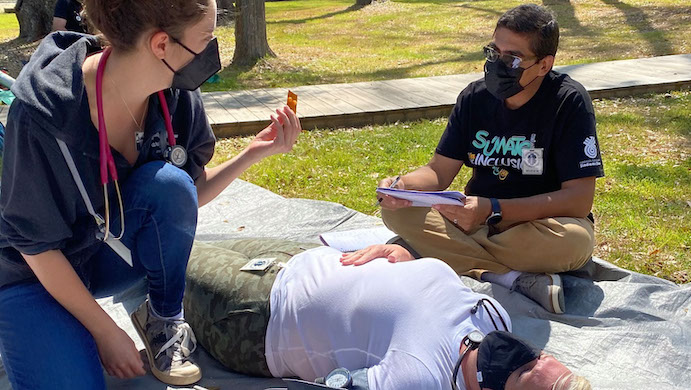
National Registry Certification examinations evaluate the competence of EMS
practitioners at a variety of levels, including Emergency Medical Responder (EMR),
Emergency Medical Technician (EMT), Advanced Emergency Medical Technician
(AEMT), and Paramedic.
NREMT credentials are either required for an initial license or accepted for legal
recognition or reciprocity in all 50 states and Puerto Rico. That makes it easier to
maintain
Spend Thanksgiving in Patagonia With NCOAE’s 31-Day Outdoor Educator Training
Outdoor Educator TrainingWhat are your plans for Thanksgiving? Here at The National Center for Outdoor & Adventure Education, we’re expanding our outdoor educator-training program on a global scale and announcing a month-long training expedition that culminates in a Thanksgiving celebration in Patagonia — a remote region at the southernmost end of South America that is shared by Argentina and Chile.
That’s a large leap from our outdoor educator training programs in North Carolina on the Eastern seaboard and Oregon and California out West. But we’re excited to be spreading our wings, and we’re even going a step further by planning a second overseas training expedition next spring — this time to Kenya for a 33-Day Outdoor Educator Instructor Training – East Africa.
But first, back to our Patagonia training. The 31-Day Outdoor Educator Instructor Training – Patagonia is co-ed and targets college students, classroom teachers and novice outdoor educators who are 18 years and older. Tuition is just $6,600. We fly from Houston, Tex., and land in Santiago, Chile, where our local team has already worked out an invigorating itinerary.
Chile is a land of extremes, from the snow-capped volcanoes of Patagonia and dizzying heights of the Andes, to the driest desert on earth and the extensive southern glacial fields. We’ll be exploring some of the most beautiful mountains and rivers in the world, and we’ll see it with fellow explorers who have the same enthusiasm and zeal for the outdoors and education that you do.
And when it comes to gaining the experience and knowledge to become an outdoor educator, there are few better “classrooms” than Patagonia and the (more…)
A More Convenient Way To Receive Wilderness First Responder Training
Wilderness First Responder Training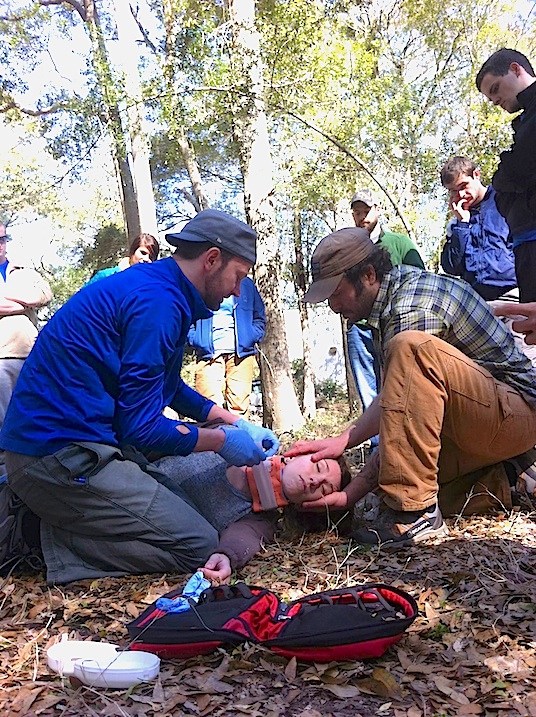 It’s a well-known fact that one outdoor education industry standard for trip leaders, wilderness guides and backcountry educators who work on multi-day expeditions, is that you have to have a current and up-to-date Wilderness First Responder (WFR) training. How you satisfy that requirement is up to you.
It’s a well-known fact that one outdoor education industry standard for trip leaders, wilderness guides and backcountry educators who work on multi-day expeditions, is that you have to have a current and up-to-date Wilderness First Responder (WFR) training. How you satisfy that requirement is up to you.
Traditionally, the only way to earn the WFR credential was to enroll in an 80-hour course that took place over a one-and-a-half to two-week timeframe. That meant taking a leave from work, packing up your stuff, saying goodbye to your family, and driving to some random outdoor facility where you’d either camp or bunk with strangers for up to 14 days while you participated in the training. And while that format is still very popular and effective, a new approach for completing ‘woofer’ training has emerged, allowing those of us who aren’t able to commit up to two weeks away (from work and family) to receive the same training and certification.
It’s called a Wilderness First Responder & Wilderness EMT Hybrid/DLP Training (the DLP part stands for distance learning project), and it combines an approved at-home study and online testing component, followed by a four-night / five-day hands-on training here at The National Center for Outdoor & Adventure Education (NCOAE) in Wilmington, North Carolina.
This NCOAE-sponsored course exceeds the Wilderness First Responder & WEMT Scope of Practice requirements endorsed by the Wilderness Medical Society and is eligible for Fellow of the Academy of Wilderness Medicine credits from WMS!
With this approach to receiving your Wilderness First Responder certification, you complete 30-50 hours of home study, successfully past four tests administered online (which means you need a computer and reliable broadband/high speed Internet access), and then make your way to Wilmington for the short hands-on component. (more…)
Sign Up For Our North Carolina Leave No Trace Trainer Course
Training & CertificationsIf you’re really interested in making the wilderness your home office, there are few programs that can get you started that are as basic and important as our Leave No Trace Trainer Course.
 Even if you have experience as a wilderness guide or outdoor educator, this two-day training gets you to a point where you can enthusiastically acquire, endorse and practice the seven principles that make up the successful Leave No Trace (LNT) philosophy.
Even if you have experience as a wilderness guide or outdoor educator, this two-day training gets you to a point where you can enthusiastically acquire, endorse and practice the seven principles that make up the successful Leave No Trace (LNT) philosophy.
Best news yet: We’ve still got space available for our Sept. 4 and 5 LTN Trainer course, which takes place in Wilmington, N.C. We’ve worked with LNT to ensure this course is ideal for educators, guides, agency employees and other outdoor education professionals. Successful graduates gain skills to teach Leave No Trace techniques and ethics to their co-workers, clients, friends and family.
Ours is a short and simple course — unlike the more advanced Master Educator LNT Training. And that’s not a bad thing, because as a result, it’s (more…)
NCOAE Receives Approval for EMT-Basic Training
Training & CertificationsWe’re pleased to announce that The National Center for Outdoor & Adventure Education (NCOAE) has received approval from the State of North Carolina and the North Carolina Office of Emergency Medical Services to offer an intensive 19-day EMT-Basic training.
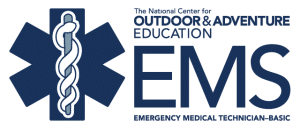 And what that means to anyone interested in securing their EMT-Basic credentials is that within three weeks of starting our intensive training, you’ll have the knowledge and experience to successfully pass the National Registry exam as well as North Carolina’s state exam, earning your EMT credentials.
And what that means to anyone interested in securing their EMT-Basic credentials is that within three weeks of starting our intensive training, you’ll have the knowledge and experience to successfully pass the National Registry exam as well as North Carolina’s state exam, earning your EMT credentials.
After that, you’ll have the option of staying with us for an additional five days for a practical session and certification of the Wilderness Upgrade. This certifies you as an EMT-B and WEMT from the Wilderness Medicine Training Center.
With your EMT credentials in hand, you’ll have an opportunity to enter a field that the Bureau of Labor Statistics claims is a “growing occupation.” Most certified emergency medical technicians (EMTs) find immediate employment at hospitals and ambulance companies, and many work for police or fire departments, receiving the same benefits as firemen and policemen — including pensions.
The median salary for an EMT is $27,070 per year, with entry-level employees averaging $17,300 and the top 10 percent earning $45,280.
There are three levels of EMT training:
- Basic EMT
- EMT-Advanced
- EMT-Paramedic
Students working toward the Basic EMT (a.k.a. EMT-B) credential here at NCOAE study patient assessment, the principals of pharmacology, BLS resuscitation, and participate in (more…)
TALK TO US
Have any further questions about our courses, what you’ll learn, or what else to expect? Contact us, we’re here to help!
